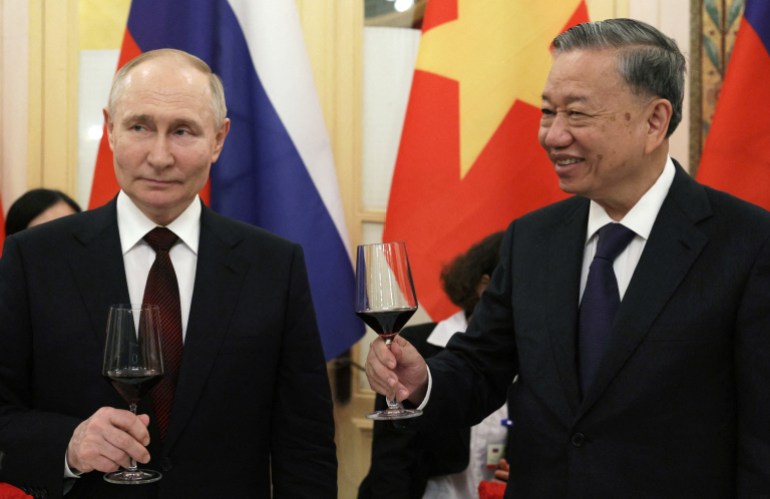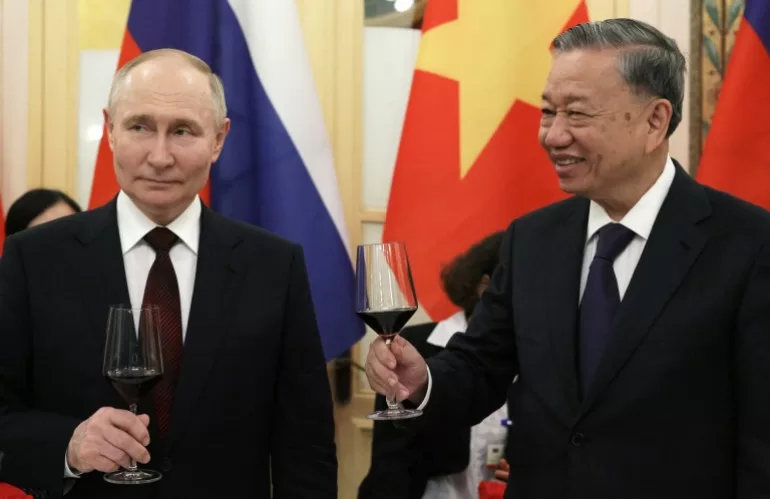Putin was speaking to reporters in Vietnam on Thursday, a day after visiting nuclear-armed North Korea and signing a mutual defence agreement with its leader, Kim Jong Un.
Western countries have shunned North Korea because of its development of nuclear and ballistic missiles in defiance of United Nations sanctions, and view the growing ties between Moscow and Pyongyang with concern.
Putin threatened earlier this month that Russia might supply arms to Western adversaries because the West was providing high-precision weapons to Ukraine and giving it permission to fire them at targets inside Russia.

In his latest comments, he said North Korea could be one such recipient of Russian arms.
“I said, including in Pyongyang, that we then reserve the right to supply weapons to other regions of the world. Taking into account our agreements with [North Korea], I do not exclude this either,” he said.
The treaty signed by Putin and Kim on Wednesday commits each side to provide immediate military assistance to the other in the event of armed aggression against either one of them.
Putin said Moscow expected that its cooperation with North Korea would serve as a deterrent to the West, but that there was no need to use North Korean soldiers for the war in Ukraine.
“Regarding the possibility of somehow using each other’s capabilities in the conflict in Ukraine, we are not asking anyone for this, no one has offered us this, therefore there is no need,” he said.
The United States and Ukraine say North Korea has already provided Russia with significant quantities of artillery shells and ballistic missiles, which Moscow and Pyongyang have denied.
Putin said South Korea would be making “a big mistake” if it decided to supply arms to Ukraine, and that Moscow would respond to such a move in a way that would be painful for Seoul.
The remarks came after South Korean news agency Yonhap said Seoul would review the possibility of supplying weapons to Ukraine in light of the mutual defence pact signed by Putin and Kim a day earlier.
“In connections to sending lethal weapons to combat zones in Ukraine, this would be a very big mistake. I hope this will not happen,” Putin said. “If it will, then we will take the according decision that the current South Korean leadership will probably not like.”
South Korea has seen a major growth in international military sales in recent years. But it has a long-standing policy of barring weapons sales into active conflict zones, which it has stuck to despite US and Ukrainian calls to reconsider.
There’s ongoing debate on how strong of a security commitment the deal between Russia and North Korea entails. While some analysts see the agreement as a full restoration of the countries’ Cold War-era alliance, others say the deal seems more symbolic than substantial.
Ankit Panda, a senior analyst at the Carnegie Endowment for International Peace, said the text appeared to be carefully worded so as to not imply automatic military invention.
But “the big picture here is that both sides are willing to put down on paper, and show the world, just how widely they intend to expand the scope of their cooperation”, he said.
In his remarks to reporters in Hanoi, Putin also expanded on comments he made earlier this month about nuclear weapons, saying Moscow was thinking about possible changes to its doctrine on their use.
Putin said this was being driven by changing views on nuclear use among Russia’s adversaries.
Russia’s existing doctrine states that it may use nuclear weapons in response to a nuclear attack or in the event of a conventional attack that poses an existential threat to the state.
Since the start of the war in Ukraine, some hawks among Russian military analysts have been advocating that Moscow should consider revising that stance and even delivering some kind of nuclear strike that might “sober up” its adversaries in the West.
Putin told reporters that Russia was thinking about changing its doctrine because its potential enemies were working on “new elements” related to lowering the threshold for nuclear use.
“In particular, explosive nuclear devices of extremely low power are being developed. And we know that there are ideas floating around in expert circles in the West that such means of destruction could be used,” he said.
Putin said there was “nothing particularly terrible” about this, but Russia needed to pay attention to it.
Since launching his full-scale invasion of Ukraine in February 2022, something he casts as a special military operation to secure Russia’s own security, Putin has frequently spoken about the size and potency of Russia’s nuclear arsenal and warned the West that it risks a global conflict if it wades deeper into the war.
